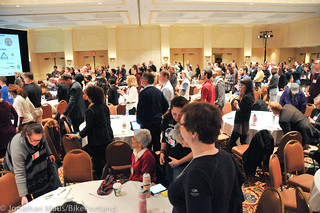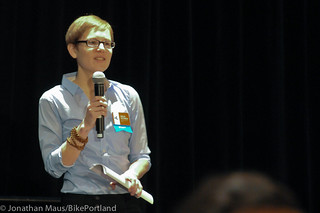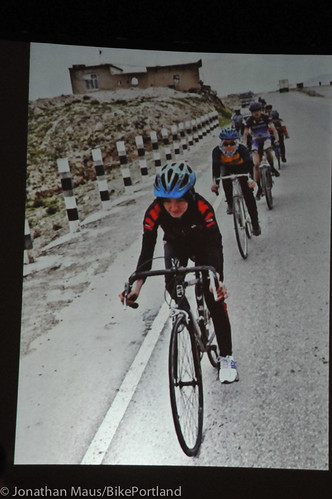
twice as many the first year in 2012.
(Photos by J. Maus/BikePortland)
BikePortland coverage from Washington D.C. is made possible by Planet Bike.
The Opening Plenary of the third annual National Women’s Bicycling Forum opened today with a series of TED-style presentations from an impressive line-up of female leaders.
About 450 people have signed up for the Women’s Forum this year, that’s over twice as many that attended the first edition in 2012. They’re hear to learn and be inspired by a full day of speakers, networking, and break-out sessions.
Before the opening plenary got started this morning, League of American Bicyclists President Andy Clarke said that their Women Bike program is “transforming the League and transforming our movement.” For the League, Women Bike has become a key pillar of their larger equity initiative which includes efforts to broaden the bicycling and advocacy tent to welcome women, communities of color, and kids.
Carolyn Szczepanski, the League’s Communications Director and founder of the Women’s Forum, charted the growth of the event since 2012. That first year had 200 participants, there were 350 the next year, and this year there are over 450 people signed up.
Those who made it here to D.C. through a major snow storm were treated to inspiring stories from six female speakers — from a former Olympic cyclist to a National Geographic Explorer.
Dorothy Nichols, the National Sales Manager for Shebeest and creator of the NORBA National mountain bike series told the crowd to not take things so seriously. “Get out and have fun and enjoy the moment,” she said. Nichols also shared her favorite quote (by Eleanor Roosevelt): “Do something everyday that scares you.”
Another speaker, Kristin Gavin, started an organization called Gearing Up that brings bicycling to women in prison and transitional homes and who have struggled with drug and alcohol addiction. In 2009 she knew biking could make an impact on these women, but she wasn’t sure where to start: “Have you ever been in a situation where you recognize biking can make an impact in people’s lives but didn’t know where to begin?” That was where Gavin was in 2009. She started with five bikes in a women’s home in Philadelphia and the program was a big hit. The bicycle has special appeal to incarcerated women because, Gavin said, “It makes them feel normal.” Beyond that, bicycles given women a way to become healthy, connect with their community, and create relationships.
Today, Gavin works with 200 women per year and in 2011 she established an indoor cycling program inside a women’s prison. And it all started, Gavin said, “Because I had a passion for biking and an intuition.”
If you think women in prison face barriers to bicycling, another speaker, Beth Gordon, spoke about her experience in making the running industry more welcoming to women. She told the story of Kathrine Switzer, the first woman to run a marathon in 1967. Gordon relayed the cultural taboos and challenges that surrounded Switzer’s historic effort. “It was 1967!” Gordon said sarcastically, “You couldn’t run, your uterus would fall out!”
If you think being in prison or being the first woman to run a marathon was a challenge; there can’t be any more daunting place in the world for women to pedal a bicycle than Afghanistan. In fact, it’s been ranked the worst place in the world to be a woman. That’s why the last speaker of the morning, Shannon Galpin, started her work there. Galpin runs an organization called Mountain 2 Mountain that brings the revolutionary power of cycling to women in conflict regions.
Galpin spoke about the “power of the bike, beyond sport” and shared that her experiences show that bicycling can be a very powerful tool for social change. While many of us see Afghanistan as a war-torn country dominated by the harsh religious laws of the Taliban, Galpin said slowly but surely, bicycling is doing the same thing for women in that country as it did for them in American 100 years ago. When women first took to cycling here in the U.S., they were called immoral and promiscuous. Despite even harsher consequences in Afghanistan, Galpin told stories about the Afghan Women’s Cycling Team who are training for the Olympics on remote highways — with male family members and the men’s cycling team riding behind them as a buffer zone.
The focus of the Women’s forum is to inspire women advocates to share cycling with women in their communities. After hearing this morning’s stories, they probably can’t wait to get home and get started.
— Follow the Women’s Forum via the #womenbike hashtag on Twitter. And you can follow all the Bike Summit tweets via #NBS14.



